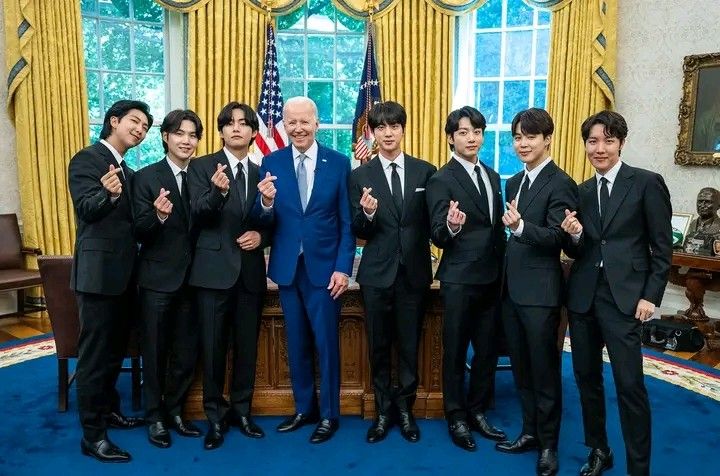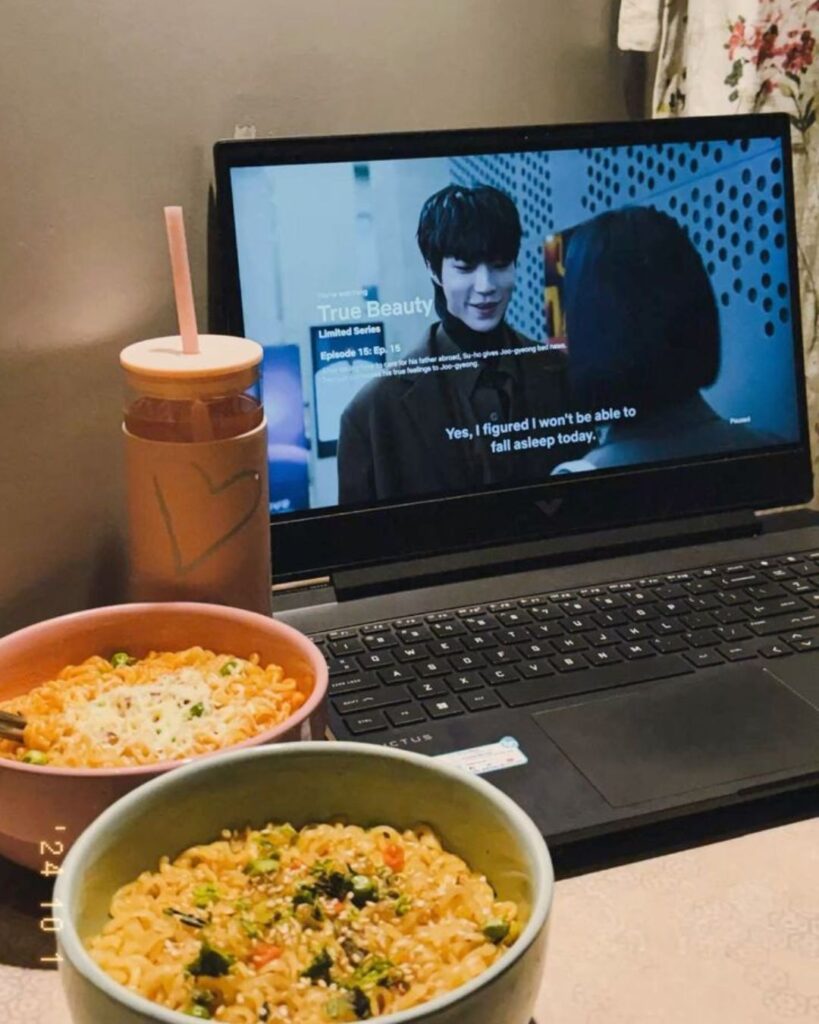Is the World Officially Hallyu-fied?
Remember BTS and UNICEF’s powerful 2018 ‘Love Yourself and Speak Yourself’ campaign? You saw Kim Naamjoon, the leader of the boy band, giving a speech not for fame but for healing. This Campaign wasn’t just about music or fandom but it addressed mental health awareness, self acceptance and the courage to speak one’s truth. Which struck the hearts of millions globally.
Imagine an assembly hall where the world’s most important decisions are ruled out everyday and a group of diplomats try to raise concerns. Group of seven boys take the stage to perform ‘Permission to Dance’ at the United Nations general assembly.
Sounds unusual?
That’s exactly what happened in 2021 where South Korea’s former President Moon Jae-in designated BTS as special presidential envoy for future generation and culture.
And millions of people were rallying on the shore of Manhattan not to be addressed by hundreds of world leaders but by the boy band. The performance was aired live on the UN’s official youtube channel. The views were record breaking, 1M during the live and crossing 6M views in a single day.

It’s hard to imagine, considering the enduring presence of Asian racism and xenophobia in the USA, yet it happened. Former president of the US, Joe Biden invited the boy band to the white house. Addressing issues like anti Asian hate crimes, disinformation. And clicking a picture with the president in classic ‘Korean heart’ gesture.
Symbolic enough?
While above are the stories from the top of the world. You might notice a group of youngsters dancing to the tunes of K-pop mimicking the elegant moves they watched on digital platforms. And across the world on a mundane day you will find people suggesting the best k-dramas to binge-watch, the latest glass-skincare products out in market and even enjoying the flavours of ramyeon, gimbap and spicy fried chicken. You might wonder what is even going on? And then think, is that an impact of globalization?
What you don’t know: it’s all a Hallyu- fever.
What is Hallyu?
Hallyu literally translates to ‘Korean Wave’ which especially refers to global popularity and influence of South Korean culture. With the popularity of K-drama, K-pop, K- movies, food, fashion, beauty products and tourism. K essentially stands for Korean in every aspect. Started as entertainment in the form of daily soap a.k.a k-dramas is now a multi-billion dollar industry globally. Believe it or not the fascination of K culture is definitely on a rise.
This is a triumph of “soft power” — a positive influence so that others admire your values and aspire to follow your examples. According to the U.S. political scientist Joseph Nye who coined the term, culture is a key asset to soft power. Or as a former South Korean president put it, “In the 21st century, culture is power.”
But what if I told you that there’s a connection between Hallyu and Jurassic Park?
In the late 1990s, during an instance when the Presidential Advisory Board on Science and Technology made a presentation to President Kim Young-sam regarding the potential export of the cultural industry in which the board pointed to the fact that the ‘Hollywood movie Jurassic Park generated as much revenue as the export of 1.5 million Hyundai cars overseas.’
The idea? Instead of just exporting electronics and cars, why not export music, drama, and identity?
Since then, the South Korean government has introduced and provided diverse policies to support cultural industries, mainly focusing on export-centered economic strategies. For instance, the Kim Dae-jung administration, beginning in 1998, announced the Hallyu Industry Support Development Plan.
Once known as a cheap alternative to Hong Kong cinema and Japanese dramas, it is now a country which produces world class dramas. Squid game is the most watched show with 1.65B hours of streaming on Netflix. And don’t forget ‘Parasite’ the first non english movie to win oscars academy award in the category of Best Picture, Best Director, Best Original Screenplay, and Best International Feature Film. And many K-pop artists have broken the Billboard records. And even non-Korean celebrities like Doja Cat to John Cena have displayed their love for K-pop.
But it was not until 2012 when a south Korean singer PSY released his single ‘Gangnam style’. The song thrashed the continent walls with catchy beats, humorous lyrics and its explicit horse dance. Reaching 1B views on you tube, a first of its time but Interestingly then the west started grooving to k-pop. Before that the Korean tsunami was limited to Asia.
K-drama = one escape
Every morning, a girl watches K-dramas on her bus ride. One day, she missed her stop because she was too busy staring at the second lead’s slow burn romance. Now she has to set alarms to get down.
The South Korean Entertainment industry has put in continued efforts to polish the skills and crazy number of large budget shows that are ruling the Charts at OTTs. Fans wait day in and out for the new episode/song to release or to stock in that one lineage Lipstick which is out of stock since that hit show aired.
Army – Parasocial Relationships
We often see at film screenings where famous celebrities come and despite the crowd’s enthusiasm, they slip out quietly surrounded by bouncers barely acknowledging the fans who wait hours just to catch a glimpse. It’s a common sigh, celebrities often keep fans at arm’s length, citing safety and personal boundaries.
On the other hand, at K-pop fan events online, idols are chatting casually with fans calling out usernames, sharing stories from their day, and even doing HiTouch sessions where fans virtually “high-five” their favorite stars. They leave no stone unturned to entertain and connect with the fans on platforms like Weverse or Vlive.
The contrast is huge. Stars usually build walls for protection, Korean idols build bridges, fostering a sense of closeness that makes fans feel seen, heard, and emotionally connected. Even if it’s through a screen. That’s why the fandom has grown so much. Calling themselves as a fandom which means loyal fans. Most of the time fandoms often have names like ‘Army’ or ‘Blinks’. These armies not only interact with the idols just for entertainment but fandom throughout the world engage in philanthropic and cosmopolitan causes.
ARMY4Palesine:
The fandom in Philippines and India have raised several million dollar funds through Campaign like #ENDViolence for the dire situations in Palestine.
Stan, Fandom, Obsession: Cult or Culture
You might wonder what is the difference between ‘fan’ and ‘stan’?
Stan = Stalker + Fan
Stan basically refers to dedicated, enthusiastic and borderline obsessive fans.
Ever noticed why suddenly all the Gen-Z are switching to loose, minimalistic and gender neutral clothing? That’s part of Hallyu fever. They have portrayed the style to be stylish, comfortable yet trendy.
For instance if Jungkook from BTS wears a loose hoodie and trousers. Suddenly everyone wants to be comfortable and style their loose slouchy clothes.
Stanning is mostly a part of fandom. On the other hand fandom is a group of people coming online on social media platforms giving updates, celebrating fan meets, interacting, buying and selling merchandise. It’s More than just liking a group or person becoming a part of their belonging, identity and community.
Sometimes the fans even go an extra mile to learn the Korean language just to understand those subtitles, lyrics and what their favourite idols have to say. Next thing we would know Is that the fans are interacting in Korean only on Weverse!!!
Gastrodiplomacy is more like winning hearts through stomachs!!

We often say in India ‘har kisi ke dil ka rasta pet se hoke jata hai’- to reach one’s heart you have to feed them good food. The Korean government took it seriously; they launched a campaign and public policy to promote their food. Not just that you might see ramyeon, kimchi and soju in every drama, in half of its episodes. It’s not just about taste now it’s about storytelling through food.
It is a delicious form of public relations where you let the food speak on behalf of the country.
Across the world Korean cuisine has become more than just a meal. From mukbang youtube videos to korean grocery hauls, to supermarkets being flooded with ramyeons to korean cafés offering gimbap and Tteok-bokki.
Before you even realise, whether it’s surfing through OTT’S to watch fav Kdrama while eating ramyeon, choose a K-pop song to pamper yourself with the sheet masks and glass skin care. Or discussing with your friend the nuances of the Korean language. You have already added ‘visiting seoul’ to your bucket list!!!
Yes it’s a legit thing. K-drama tourism where people from overseas visit South Korea to see filming locations. Or in the hopes of finding the perfect Kdrama partner!!
On that note, Can culture be truly established and exported?? If yes, ‘is the world officially HALLYU-fied?’
Thanks for reading, fr! Share if you like it enough. Follow us on Instagram & LinkedIn for more.
Articulated By Mansi Hake, 3rd year Student at Media and communication, Fergusson College.


